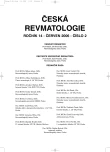The role of synovial fibroblasts in the pathogenesis of rheumatoid arthritis
Význam synoviálních fibroblastů v patogenezi revmatoidní artritidy
Revmatoidní artritida (RA) je chronické autoimunitní zánětlivé onemocnění, které vede k destrukci kloubů. V synoviální tkáni postiženého kloubu je pozorována zvýšená proliferace a hyperplazie buněk synoviální intimy, tvorba prozánětlivých cytokinů, chemokinů a akumulace imunokompetentních buněk. V posledních letech jsou v popředí zájmu při výzkumu patogeneze RA synoviální fibroblasty. Ty jsou aktivovány prozánětlivými cytokiny makrofágů a lymfocytů, nacož následně odpovídají tvorbou enzymů degradujících matrix, které vedou k progresivní destrukci kloubu. RA synoviální fibroblasty však vykazují invazivní potenciál i nezávisle na přítomnosti imunokompetentních buněk a prozánětlivých cytokinů. Autor se v tomto článku věnuje morfologii fibroblastů, jejich narušené apoptóze, interakci fibroblastů s imunokompetentními buňkami, aktivaci synoviálních fibroblastů nezávisle na cytokinech a účasti aktivovaných fibroblastů na destrukci kloubu během patogeneze RA.
Klíčová slova:
revmatoidní artritida, prozánětlivé cytokiny, synoviální fibroblasty
Authors:
L. Šenolt
Authors‘ workplace:
Revmatologický ústav, Praha
Published in:
Čes. Revmatol., 14, 2006, No. 2, p. 65-70.
Category:
Overview Reports
Overview
Rheumatoid arthritis (RA) is a chronic autoimmune inflammatory disease leading to inevitable joint destruction. An increased proliferation and hyperplasia of synovial lining cells in synovial tissue of affected joint is observed. Moreover, production of pro-inflammatory cytokines, chemokines, and accumulation of immunocompetent cells within the joint is also observed. Current research is specifically focused on the concept of synovial fibroblasts in the pathogenesis of RA. These cells are activated by pro-inflammatory cytokines secreted by macrophages and leukocytes, thereafter responding by an increased production of matrix degrading enzymes that lead to progressive joint destruction. RA synovial fibroblasts have also invasive potential independently on the presence of both immunocompetent cells and pro-inflammatory cytokines. In this overview, the author discusses morphology of synovial fibroblasts, altered apoptosis, and interaction of fibroblasts with immunocompetents cells. Furthermore, cytokine-independent activation of synovial fibroblasts, and the role of activated fibroblasts in the process of joint destruction within the pathogenesis of RA are also mentioned.
Key words:
rheumatoid arthritis, pro-inflammatory cytokines, synovial fibroblasts
Labels
Dermatology & STDs Paediatric rheumatology RheumatologyArticle was published in
Czech Rheumatology

2006 Issue 2
-
All articles in this issue
- Immunolocalization of 3-nitrotyrosine in human synovium
- The role of osteoprotegerin in diffuse idiopathic skeletal hyperostosis and ankylosing spondylitis
- The role of synovial fibroblasts in the pathogenesis of rheumatoid arthritis
- Complex morphological examination of patients with ankylosing spondylitis
- The role of vitamin D in prevention and therapy of glucocorticoid-/inflammation-induced osteoporosis
- Osteoporosis in some inflammatory rheumatic diseases
- Czech Rheumatology
- Journal archive
- Current issue
- About the journal
Most read in this issue
- Osteoporosis in some inflammatory rheumatic diseases
- Complex morphological examination of patients with ankylosing spondylitis
- The role of synovial fibroblasts in the pathogenesis of rheumatoid arthritis
- The role of vitamin D in prevention and therapy of glucocorticoid-/inflammation-induced osteoporosis
